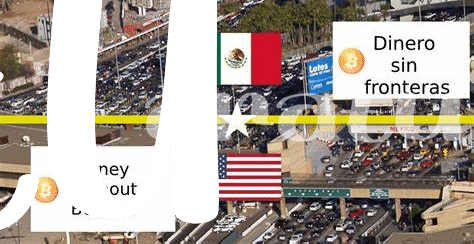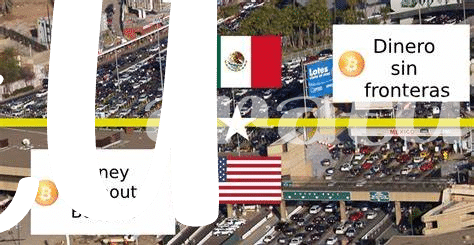Overview 🌐

Bitcoin’s increasing popularity has paved the way for a groundbreaking revolution in cross-border remittances. As digital currencies continue to gain traction globally, the landscape of financial transactions is experiencing a notable shift towards efficiency and accessibility. The utilization of Bitcoin for remittances is particularly significant in Mexico, where traditional banking systems often present obstacles for sending and receiving funds across borders. With its decentralized nature and borderless capabilities, Bitcoin offers a promising solution to the challenges faced by many Mexicans seeking to securely transfer money abroad. This overview sets the stage for exploring the legal framework, process, benefits, challenges, and future possibilities surrounding Bitcoin cross-border remittances in Mexico.
Mexican Regulation 🇲🇽
In Mexico, the regulation surrounding Bitcoin cross-border remittances plays a crucial role in shaping the landscape for individuals looking to send funds internationally. The government has been proactive in establishing guidelines to ensure the legality and security of such transactions. By navigating the regulatory framework, both senders and receivers can have more confidence in the transparency and compliance of the remittance process. Understanding the Mexican regulatory environment is essential for anyone involved in Bitcoin transactions to avoid potential risks and complications. It not only sets the boundaries for compliance but also opens up opportunities for innovation and growth in the realm of cross-border remittances. By staying informed about the legal requirements in Mexico, participants in the Bitcoin ecosystem can contribute to the development of a more robust and reliable financial infrastructure for remittance services.
Bitcoin Remittance Process 📲

Bitcoin remittance process essentially involves utilizing digital currency, such as Bitcoin, to facilitate cross-border money transfers. This innovative method allows individuals in Mexico to send funds to their loved ones abroad quickly and securely using just a smartphone or computer. The process typically begins by converting the desired amount of Mexican pesos into Bitcoin through a cryptocurrency exchange platform. Once the Bitcoin is acquired, the sender can then transfer it to the recipient’s digital wallet in another country. The recipient can easily convert the received Bitcoin back into their local currency or choose to hold it as an investment for potential future gains. This streamlined approach bypasses traditional financial institutions, resulting in lower transaction fees and faster processing times, making it an attractive option for many individuals seeking to send money internationally.
Benefits for Mexicans 💸

The adoption of Bitcoin for cross-border remittances has brought a multitude of benefits for Mexicans. By leveraging this innovative technology, individuals can send and receive funds quickly, securely, and at a lower cost compared to traditional methods. Additionally, Bitcoin provides access to financial services for those who are unbanked or underbanked, empowering them to participate in the global economy. The transparency and efficiency of Bitcoin transactions offer a level of financial inclusion previously inaccessible to many Mexicans. Furthermore, the decentralized nature of Bitcoin eliminates the need for intermediaries, reducing the associated fees and delays. These advantages not only improve the overall remittance experience but also contribute to the financial well-being and prosperity of individuals in Mexico. For a comprehensive guide on compliance guidelines related to using Bitcoin for money transfers, you can refer to the bitcoin cross-border money transfer laws in Marshall Islands.
Challenges and Risks 🛑
Navigating the world of Bitcoin cross-border remittances in Mexico comes with its fair share of challenges and risks. One key challenge is the volatility of the cryptocurrency market, as the value of Bitcoin can fluctuate significantly within a short period. This poses a risk for individuals looking to send or receive remittances, as they may end up with a different amount than initially planned. Additionally, the lack of clear regulatory guidelines around Bitcoin remittance transactions in Mexico can create uncertainty and potential legal issues for both senders and receivers. This regulatory ambiguity could deter some individuals from utilizing Bitcoin for remittances, opting for more traditional methods instead.
On the flip side, security concerns also loom large in the realm of Bitcoin remittances. The decentralized nature of cryptocurrencies like Bitcoin can make transactions irreversible, potentially exposing individuals to fraud or hacking risks. Without proper safeguards in place, users may fall victim to cyber attacks or scams, jeopardizing their hard-earned money. Overcoming these challenges and mitigating risks will be crucial for the successful integration of Bitcoin cross-border remittances in Mexico’s financial landscape.
Future Opportunities 🚀

In the rapidly evolving landscape of cross-border remittances, Mexico stands at the forefront of embracing Bitcoin as a viable solution. The future opportunities for leveraging cryptocurrency in remittance services present a promising avenue for enhancing financial inclusion and efficiency. As regulatory frameworks continue to adapt to technological advancements, there is a growing potential for Bitcoin to streamline international money transfers, reducing reliance on traditional banking systems and lowering associated fees. This shift towards innovative payment solutions not only benefits the Mexican population by providing faster and more cost-effective remittance options but also sets the stage for greater financial accessibility and empowerment in the digital era.
For further insights into global cryptocurrency regulations impacting cross-border money transfers, explore the latest developments in Bitcoin cross-border money transfer laws in Malta, ensuring compliance and understanding key legal considerations within the realm of financial technology.
